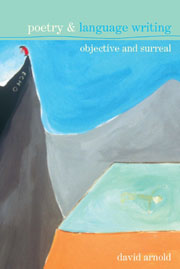Book contents
- Frontmatter
- Contents
- Acknowledgements
- List of permissions
- 1 The Scholarly Life of Language Writing
- 2 Surrealism: An Excommunicated Vessel?
- 3 Under the Sign of Negation: William Carlos Williams and Surrealism
- 4 The Surreal-O-bjectivist Nexus
- 5 Michael Palmer's Poetics of Witness
- 6 Scorch and Scan: The Writing of Susan Howe
- 7 ‘Just Rehashed Surrealism’? The Writing of Barrett Watten
- Notes
- Bibliography
- Index
1 - The Scholarly Life of Language Writing
- Frontmatter
- Contents
- Acknowledgements
- List of permissions
- 1 The Scholarly Life of Language Writing
- 2 Surrealism: An Excommunicated Vessel?
- 3 Under the Sign of Negation: William Carlos Williams and Surrealism
- 4 The Surreal-O-bjectivist Nexus
- 5 Michael Palmer's Poetics of Witness
- 6 Scorch and Scan: The Writing of Susan Howe
- 7 ‘Just Rehashed Surrealism’? The Writing of Barrett Watten
- Notes
- Bibliography
- Index
Summary
It has been variously labelled ‘Language poetry’, ‘Language writing’, ‘L=A=N=G=U=A=G=E writing’ (after the magazine that ran from 1978 to 1981) and ‘Language-centred writing’. It has been variously defined as non-referential or of diminished reference, as textual poetry or a critique of expressivism, as a reaction against the ‘workshop’ poetry enshrined in creative writing departments across the United States. It has been variously described as non-academic, theory conscious, avant-garde, postmodern and oppositional. It has been placed according to its geographical positions, on east or west coasts of the United States; its venues in small magazines, independent presses and performance spaces; and its descent from historical precursors, be they the Objectivists, the composers-by-field of the Black Mountain school, the Russian Constructivists or American modernism à la William Carlos Williams and Gertrude Stein. Indeed, one of the few statements that can be made about it with little qualification is that ‘it’ has both fostered and endured a crisis in representation more or less since it first became visible in the 1970s.
As far as period is concerned, it currently occupies a liminal space between past and present. For a start, most of the writers involved are still alive, and writing. That said, the positions from which they write, not to mention the audiences for and the contexts of their writing, have changed dramatically since the 1970s. Language writing – for this is what I am going to call ‘it’ – now features in university syllabuses on both sides of the Atlantic, and several of those involved have accepted academic appointments.
- Type
- Chapter
- Information
- Poetry and Language WritingObjective and Surreal, pp. 1 - 18Publisher: Liverpool University PressPrint publication year: 2007



